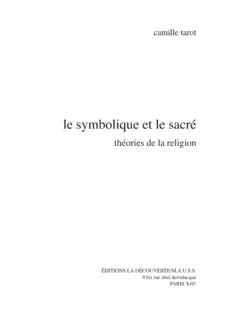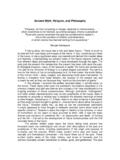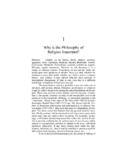Transcription of Marcel Mauss: In Pursuit of the Whole. A Review Essay
1 Marcel Mauss: In Pursuit of the Review EssayKEITH HARTA nthropology, Goldsmiths University of LondonEmile Durkheim assembled a team to promote his vision for sociology, but heand Mauss were in many ways a double act, like Marx and Engels. There wasroom for only one leader of the movement, so we speak of the Durkheimiansand the Marxists. Mauss and Engels each assumed leadership of the movementthey jointly founded after their partner s death, but the intrinsic inequality of thepartnership was made worse in Mauss case by age difference, kinship senior-ity, and his inability to write books of his own. The publication of an abridgedEnglish translation of Marcel Fournier sMarcel Mauss: A Biography(2006[1994]) allows us to reconsider his historical relationship with Durkheim, aswell as his legacy for anthropology, history, and the social sciences scholarship on Mauss is, of course, much more advanced than itsAnglophone counterpart and it is less confined to academic anthropology.
2 Four-nier s 800-page collection of Mauss E crits politiques(1997) remains virtuallyunknown to English-speakers and the collective organized in his name, theMouvement Anti-Utilitariste dans les Sciences Sociales(with its journal,revue de MAUSS), continues the eponymous founder s commitment to integrat-ing progressive politics and intellectual work over a wide range of issues. Inboth cases,The Gift(1990 [1925]) has iconic significance as Mauss most dis-cussed work; but, as Sigaud (2002) has already pointed out, the Anglophoneacademy, with assistance from one or two leading French anthropologists,has taken up its message in ways that depart seriously from the author s short Review Essay accordingly has two parts. In the first, I will outline aschematic trajectory of Mauss life, conceived of first as Durkheim s juniorpartner and afterwards as himself.
3 The initial phase lasted from 1895, whenMauss entered academic employment as anagre ge in philosophy aged twenty-three, to the outbreak of war in 1914. This was followed by a decade of greatS0010417507000564jrapp: 1 13 Techset Composition Ltd, Salisbury, : Email: Website: am grateful to Philippe Steiner for his comments and additional references; and to DavidAkin as editor and Studies in Society and History 2007:49(2):1 $ #2007 Society for Comparative Study of Society and HistoryDOI: fulfillment, first in military service and afterwards as the leader ofhis uncle s cause, following Durkheim s premature death in 1917. Mauss nowflourished as a political journalist, while redefining his main academic interestas the relationship between socialism and the nation.
4 The years 1920 1925account for fully two-thirds of the political writings assembled by culminated in the foundation of theInstitut d Ethnologiewith Mauss atits head and, not coincidentally, in the publication ofThe livedanother twenty-five years after that. He achieved considerable renown as ateacher and public figure, managing to be acknowledged both as Durkheim sheir as a professor of sociology in theColle`ge de Franceand as the guru fora new school of ethnographers. His political engagements waned in thisperiod and his academic publications even more so. His last decade was asad one, when he was first forced to withdraw as a Jew in German-occupiedParis and then was more or less abandoned by people who later claimed tolionize him.
5 He died in 1950 in his late second part of this Essay considers The Strange History ofThe Gift. My aim here is to show that the Essay s prominence in contemporary anthro-pological discourse owes almost nothing to Mauss agenda in writing it. Thisis because his political program, articulated so fully in the same period, hasdropped out of sight, being replaced by the star-struck concerns of an academicelite. But it has to be acknowledged that his text is in some ways rather obscure,permitting a variety of interpretations. It was also a vehicle for Mauss to asserthimself against Durkheim s sociological reductionism in Pursuit not only of anintegrated intellectual politics, but also of an opening up to the full complexityof human existence which he summarized in the rather mystical phrase totalsocial fact.
6 This message was hard to understand at the time as his long-termcollaborator, Henri Hubert, told him but is even more so in our age ofacademic bureaucracy and specialization. I conclude that Mauss value for ustoday lies in his attempt to integrate politics and intellectual life in the headyyears after the First World War, of whichThe Giftwas one enigmaticoutcome (cf. Godelier 1999). Marcel Fournier s achievement as Mauss biographer and archivist is hard tooverstate. Without his patient labors, Mauss would be even more the creature ofmyth and legend than he is. A Montreal sociologist, Fournier describes this asan intellectual biography, yet his treatment of the main texts is rather cursoryand much concerning Mauss central ideas remains opaque.
7 For example, welearn that he was a methodological tiger, often attacking authors in his countlessbook reviews for their errors in this regard. Yet readers of this book would beexcused for wondering what Mauss methods actually were. Instead, what weget is a very rich account of Mauss social life and relationships. This balanceis appropriate, since the protagonist occasionally expressed doubts about theintellectual life and his uncle, for one, sometimes wondered if he was moresuited to cafe society than to hard academic work. Reflecting his own2 keith HART444546474849505152535455565758596061 6263646566676869707172737475767778798081 8283848586personality rather than Durkheim s, Mauss kept pushing for a more concreteand complex approach to studying the human condition than the modernsocial sciences allow for.
8 He supervised a revolution in French anthropologythat he was never able to participate in directly, while the sociology he pro-fessed came under acute pressure during the interwar years. Marcel Mauss own life is the total social fact whose meaning he sought to illuminate andwhich we have to excavate. Even his apparent failures offer us much opportu-nity for reflection. While the twentieth century denied his enterprise at everyturn, he sought a method for placing the whole person in society as a LIFE IN THREE STAGES1. 1895 1914E mile Durkheim sThe Division of Labor in Society, a version of his doctoralthesis written while teaching at Bordeaux, was published in 1893. It provideda template for the school of sociology he sought to found and his nephew, Marcel Mauss, was still addressing its central concerns more than thirtyyears later, when he wroteThe Gift.
9 The idea of economic progress throughspecialization was at the core of the British economics founded by AdamSmith (1776). A century later economic individualism was the cornerstoneof an evolutionary social theory articulated by Herbert Spencer (1897) andpopularized as the native ideology of a triumphant western bourgeoisie. Dur-kheim sought to show that division was a dialectical process of separationand integration, that society became stronger as labor was divided and as thescope for individual action was enhanced. Emphasis on the making of individ-ual contracts obscured the social glue of the non-contractual element in thecontract that made the economy possible a combination of law, state,customs, morality, and shared history that it was the sociologist s task tomake more visible.
10 The individual is the result of social development andnot, as in Smith s origin myth, its s aim, in a socialist tradition begun by Saint-Simon, was touncover the sources of solidarity, of which he identified two main types: mech-anical and organic. The first was grounded in the sameness of primitive orstateless societies and was expressed as aconscience collective, while thesecond arose from higher levels of interdependence in economies whose differ-entiation obscured common interests. Modern nations draw on a culture ofsameness while organizing a complex division of labor. Durkheim hoped topromote the stability of the French Third Republic through a syndicalist politics(the professional association of occupational groups) that was antagonistic toclass-based socialism.





